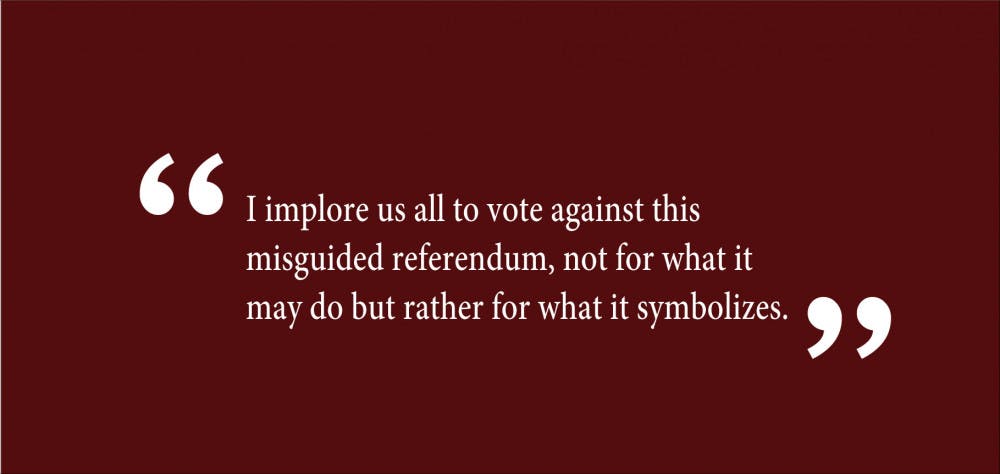Shortly after the United Nations voted in 1947 to partition Palestine into two states, one Jewish and one Arab, the Arab world was incensed. Syria’s then president Shukri al-Quwatli threatened to “eradicate Zionism.” The Egyptian king Farouk declared that the Jews would soundly be driven from Palestine. General Secretary of the Arab League Azzam Pasha claimed that “We will sweep them into the sea.”
Seventy years later, many Jews continue to endure the reality of maltreatment on the basis of their religion. In 2017, 938 of the 1,564 total anti-religious hate crimes in the United States — 60 percent — targeted Jews, who number fewer than 2 percent of the country’s population. In this context, I am deeply concerned about the Boycott, Divestment and Sanctions movement, which promotes various forms of boycott against Israel, ostensibly on the grounds of defending human rights and denouncing imperialism.
This anti-Zionist movement is in some ways the buttoned-up, modern cousin of millennia-old antisemitism. Anti-Zionism, opposing the political movement of Jews to self-determination, may not always manifest in antisemitism, but it often can in the case of the BDS movement. The Jewish people have long sought to achieve freedom and peace in their ancestral home, Israel. Yet the BDS movement rejects the existence of a majority Jewish state and applies egregious double standards to Israel’s actions, all while remaining silent on far more atrocious human rights violations.
Now, BDS has come to Brown in the form of the campaign #BrownDivest. While #BrownDivest posits that it does not advocate for a “political solution,” per a statement on its website, the group undeniably invokes BDS, a group whose advocacy suggests inherently political changes to Israel.
On March 19, the Undergraduate Council of Students will open online voting on a referendum to “divest all stocks, funds, endowment and other monetary instruments from companies complicit in human rights abuses in Palestine,” according to the referendum’s official wording.
Thankfully, regardless of the vote’s outcome, it is unlikely the University will ever adopt its mandate. The UCS resolution is merely a recommendation aimed at influencing the University-hired portfolio managers who invest Brown’s endowment. In reality, no professional fund manager worth his or her salt would exclude the multitude of companies that partake in Israel’s thriving economy from a portfolio.
Regardless, the referendum prompts an interesting thought experiment. Why is it that so many self-described progressives, including some members of the Brown student body, denounce Israel and its stakeholders? What is the root of the connection between anti-Zionism and certain blocs of progressivism?
Many will justify anti-Israel sentiment on the basis that Israel engages in apartheid, a system of state-sanctioned segregation and oppression by race or ethnicity. BDS’ mission statement explicitly claims to stand against “Israeli apartheid.” Yet, 14 percent of members of the Knesset, Israel’s parliament, are Arab-Israeli, just below their 21 percent share of the Israeli population. Two Arab-Israelis have sat on the country’s Supreme Court. Until its dissolution last month, the third biggest party in the Knesset was the Joint List — a vocally anti-Zionist party — which 82 percent of Arab-Israelis support. Israeli laws in no way resemble the state-enforced discrimination in apartheid South Africa, which entirely disenfranchised its black minority population. What apartheid state would be so ineffective at enforcing apartheid?
And what is Israel’s record on issues that progressives often care about? In Israel’s most recent elections, progressive parties came to power in a number of municipal districts, touting policies such as women’s rights, same-sex marriage and adoption. As part of its agreement to the Paris climate accords, Israel promised to maintain the same levels of greenhouse gas emissions in 2030. How are we doing on that front? Double standards abound.
This is not to depict Israel as a flawless state. Israeli settlements in the Palestinian territories are a disgrace to Israel’s espoused liberal values. Israel’s belligerence against neighboring Palestinians, even in attempts to defend itself, is often excessive. Its Prime Minister, Benjamin Netanyahu, has recently tacked to the Trumpian right. BDS criticizes Israel for these issues, but the movement’s commitment to holding alleged human rights abusers accountable is not consistent.
BDS is damningly silent on China, which has been accused of killing or imprisoning one million Uighur Muslims. You would be hard-pressed to find an on-campus movement denouncing Myanmar for exterminating the Rohingya. Where is the resolution requesting Brown divest from companies involved in Saudi Arabia, one of the United States’ biggest allies, for its treatment of women, journalists and the Yemeni people?
Proponents of the BDS movement focus on Israel’s flaws and paint the country in broad strokes in an effort to delegitimize it. Regardless of your view on the Israeli-Palestinian conflict, BDS is not the answer. BDS rejects Israel’s right to exist, a claim so uncompromising that it runs counter to basic academic values of promoting engagement around intractable issues. Student governments should pass resolutions championing engagement between Israelis and Palestinians rather than resolutions that silence one side of the issue.
BDS is a wolf in sheep’s clothing. It masquerades as a noble display of support for oppressed people while concealing its intentions to demonize the Jewish state. Like every other country in recorded history, Israel has imperfect policies. But unlike its neighbors, Israel has the democratic framework to continuously improve these policies.
Though supporters of #BrownDivest may believe their intentions are virtuous, dichotomizing this issue grossly distorts contemporary politics. I implore us all to vote against this misguided referendum, not for what it may do but rather for what it symbolizes.
Kyle Price ’20 can be reached at kyle_price@brown.edu. Please send responses to this opinion to letters@browndailyherald.com and op-eds to opinions@browndailyherald.com.





